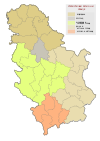Knić
 From Wikipedia the free encyclopedia
From Wikipedia the free encyclopedia
Knić Кнић (Serbian) | |
|---|---|
Town and municipality | |
 Church of Saint Elijah in Knić | |
 Location of the municipality of Knić within Serbia | |
| Coordinates: 43°55′35″N 20°43′10″E / 43.92639°N 20.71944°E | |
| Country | |
| Region | Šumadija and Western Serbia |
| District | Šumadija |
| Settlements | 36 |
| Government | |
| • Mayor | Srećko Ilić (SNS) |
| Area | |
| • Village | 27.19 km2 (10.50 sq mi) |
| • Municipality | 413 km2 (159 sq mi) |
| Elevation | 320 m (1,050 ft) |
| Population (2022 census)[3] | |
| • Town | 1,942 |
| • Town density | 71/km2 (180/sq mi) |
| • Municipality | 11,729 |
| • Municipality density | 28/km2 (74/sq mi) |
| Time zone | UTC+1 (CET) |
| • Summer (DST) | UTC+2 (CEST) |
| Postal code | 34240 |
| Area code | +381(0)34 |
| Car plates | KG |
| Website | www |
Knić (Serbian Cyrillic: Кнић) is a village and municipality located in the Šumadija District of central Serbia. According to 2022 census, the population of the town is 1,942, while population of the municipality is 11,729.
History
[edit]Rocky hills above the village of Borač, about 10 km northwest of Knić, have been inhabited for thousands of years. The first fort was built by the Romans, who used it as an observation post of an important Roman road.[4] A medieval Serbian town was located here for several centuries, reaching its peak at the time of Stefan Lazarević. The remains of Borač Fortress are protected as a cultural monument of great importance.[5]
Settlements
[edit]Aside from the town of Knić, the municipality includes the following settlements:
Demographics
[edit]| Year | Pop. | ±% p.a. |
|---|---|---|
| 1948 | 28,380 | — |
| 1953 | 26,982 | −1.01% |
| 1961 | 25,599 | −0.66% |
| 1971 | 23,192 | −0.98% |
| 1981 | 20,965 | −1.00% |
| 1991 | 18,724 | −1.12% |
| 2002 | 16,148 | −1.34% |
| 2011 | 14,237 | −1.39% |
| 2022 | 11,729 | −1.75% |
| Source: [6] | ||
As of 2011 census, the municipality had 14,237 inhabitants.
Ethnic groups
[edit]The ethnic composition of the municipality:[7]
| Ethnic group | Population | % |
|---|---|---|
| Serbs | 14,081 | 98.90% |
| Montenegrins | 22 | 0.15% |
| Croats | 9 | 0.06% |
| Yugoslavs | 5 | 0.04% |
| Macedonians | 5 | 0.04% |
| Hungarians | 4 | 0.03% |
| Others | 111 | 0.78% |
| Total | 14,205 |
Economy
[edit]The following table gives a preview of total number of registered people employed in legal entities per their core activity (as of 2018):[8]
| Activity | Total |
|---|---|
| Agriculture, forestry and fishing | 14 |
| Mining and quarrying | - |
| Manufacturing | 565 |
| Electricity, gas, steam and air conditioning supply | 25 |
| Water supply; sewerage, waste management and remediation activities | 42 |
| Construction | 30 |
| Wholesale and retail trade, repair of motor vehicles and motorcycles | 288 |
| Transportation and storage | 115 |
| Accommodation and food services | 80 |
| Information and communication | 11 |
| Financial and insurance activities | 2 |
| Real estate activities | - |
| Professional, scientific and technical activities | 56 |
| Administrative and support service activities | 7 |
| Public administration and defense; compulsory social security | 162 |
| Education | 178 |
| Human health and social work activities | 113 |
| Arts, entertainment and recreation | 14 |
| Other service activities | 53 |
| Individual agricultural workers | 482 |
| Total | 2,237 |
Famous residents
[edit]- Stevan Knićanin, a commander of the Serbian volunteer squads in the Serbian Vojvodina during the 1848/1849 revolution.
References
[edit]- ^ "Municipalities of Serbia, 2006". Statistical Office of Serbia. Retrieved 2010-11-28.
- ^ "Насеља општине Кнић" (PDF). stat.gov.rs (in Serbian). Retrieved 22 April 2019.
- ^ "Census 2022: Total population, by municipalities and cities". popis2022.stat.gov.rs.
- ^ "Борачки крш". Туристичка организација општине Кнић (in Serbian). Retrieved 2024-11-10.
- ^ "Споменици културе у Србији". spomenicikulture.mi.sanu.ac.rs. Retrieved 2024-11-10.
- ^ "2011 Census of Population, Households and Dwellings in the Republic of Serbia" (PDF). stat.gov.rs. Statistical Office of the Republic of Serbia. Retrieved 22 April 2019.
- ^ "ETHNICITY Data by municipalities and cities" (PDF). stat.gov.rs. Statistical Office of Serbia. Retrieved 22 April 2019.
- ^ "MUNICIPALITIES AND REGIONS OF THE REPUBLIC OF SERBIA, 2019" (PDF). stat.gov.rs. Statistical Office of the Republic of Serbia. 25 December 2019. Retrieved 28 December 2019.
External links
[edit]




